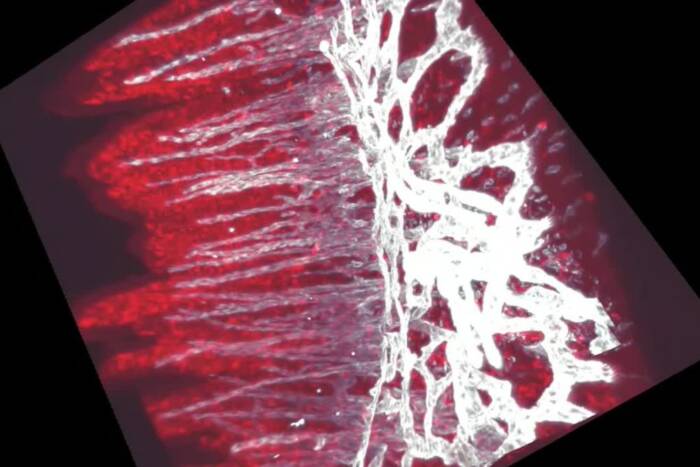Bruce S. McEwen to receive Scolnick Prize for research on brain hormones
Bruce S. McEwen is the winner of the 2011 Edward M. Scolnick Prize in Neuroscience, the McGovern Institute for Brain Research at MIT announced today. The Scolnick Prize is awarded annually by the McGovern Institute to recognize outstanding advances in the field of neuroscience.
“Bruce has made pioneering discoveries about the effects of stress hormones on the brain,” says Marc Tessier-Lavigne, president of The Rockefeller University. “His research has shown how chronic stress damages the brain, while acute stress can prove to be beneficial. Bruce’s findings have direct implications for improving human health.”
McEwen,
 Alfred E. Mirsky Professor and head of the Harold and Margaret Milliken Hatch Laboratory of Neuroendocrinology, has spent over four decades studying how hormones regulate the brain and nervous system. His research focuses on the cellular and molecular mechanisms underlying the effects of stress and sex hormones on neurogenesis, synaptogenesis and dendritic remodeling in the hippocampal region of the adult and developing brain. The hippocampus is involved in the formation of episodic, spatial and contextual memories, and is one of the first brain structures to degenerate in Alzheimer’s disease.
Alfred E. Mirsky Professor and head of the Harold and Margaret Milliken Hatch Laboratory of Neuroendocrinology, has spent over four decades studying how hormones regulate the brain and nervous system. His research focuses on the cellular and molecular mechanisms underlying the effects of stress and sex hormones on neurogenesis, synaptogenesis and dendritic remodeling in the hippocampal region of the adult and developing brain. The hippocampus is involved in the formation of episodic, spatial and contextual memories, and is one of the first brain structures to degenerate in Alzheimer’s disease.
Work by McEwen and his colleagues has shown that in the hippocampus, chronic stress causes neurons to undergo a remodeling of dendrites, changes that are largely reversed once the stress is removed, at least in young adult animals. His laboratory has extended these studies on the hippocampus to the prefrontal cortex and the amygdala, two other brain areas important for memory as well as emotional control. Both of these brain areas respond to chronic stress by remodeling of neurons — growth of some types of neurons and shrinkage of others.
McEwen also has been a proponent of the concept of allostatic load, a term he coined in 1993. The concept explains how chronic exposure to the body’s stress response — a very helpful response to acute threats — also takes a toll on many organs, including the cardiovascular system, the immune system and the brain.
McEwen received his bachelor’s degree in chemistry from Oberlin College in 1959 and his Ph.D. in cell biology from Rockefeller University in 1964. He was a United States Public Health Service Postdoctoral Fellow at the Institute of Neurobiology in Göteborg, Sweden, from 1964 to 1965, worked as an assistant professor in the zoology department at the University of Minnesota and then returned to Rockefeller in 1966 as assistant professor. He was appointed associate professor in 1971 and professor and head of laboratory in 1981 and was named Alfred E. Mirsky Professor in 1999.
McEwen is a past president of the Society for Neuroscience. He is a member of the National Academy of Sciences, the American Academy of Arts and Sciences and the Institute of Medicine. In 2010, he received a share of the IPSEN Foundation Prize in Neuroplasticity. In 2009, he received the Gold Medal award from the Society for Biological Psychiatry. In 2005 he received the Pasarow Award in Neuropsychiatry. He is a recipient of the Dale Medal of the British Endocrine Society, and in 2005 he received the Goldman-Rakic Prize for Cognitive Neuroscience from the National Alliance for Research for Schizophrenia and Depression and the Karl Spencer Lashley Award from the American Philosophical Society.
McEwen is the author or co-author of more than 900 scientific papers, and he has co-authored two books: The Hostage Brain, with Harold M. Schmeck, Jr., and The End of Stress as We Know It, with Elizabeth N. Lasley.
He is a regular advisor to the National Scientific Council on the Developing Child and the National Academy of Sciences and Institute of Medicine, and, as president of the Society for Neuroscience, he launched the popular “Brain Awareness Week” program.
The McGovern Institute will award the Scolnick Prize to McEwen on September 26, 2011. The prize, which is endowed through a gift from Merck Research Laboratories to the McGovern Institute, consists of a $60,000 award, plus an inscribed gift.


